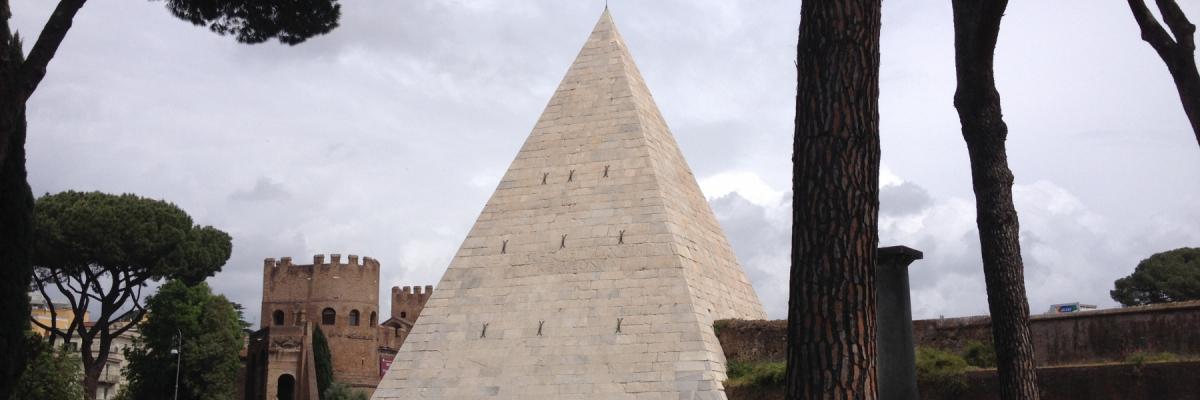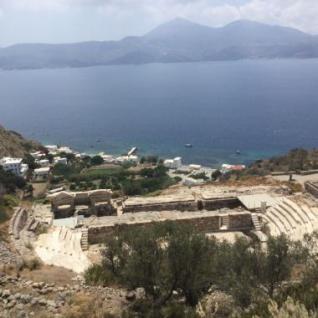Classical Studies Minor (HBA)
Admissions Category: Social Sciences & Humanities

Program Overview
Classical studies is a pluridisciplinary field that involves disciplines such as history, literature, religion, languages and linguistics, art history, archaeology, and philosophy, and pertains to the study of wide areas of Europe, North Africa and Asia from c. 2000 BCE to c. 700 CE. The expression “classical” is commonly used to designate the areas and periods populated or dominated by the Greeks and Romans. Yet this was also a complex, heterogeneous, permeable, mixed and constantly evolving world in which the Greeks and the Romans were always intertwined with other peoples and cultures. Classical Studies at UTSC offers students both a thorough examination of the main features of the Greek and Roman worlds and a substantial introduction to the other peoples and cultures which were part of or interacted with it.
Complementary Programs:
History, English, Philosophy, Art History, Arts and Media, French, Anthropology, Political Science
Check out future career opportunities and skills acquired from completing this program:
Competencies & Skills
- Formulate research questions and design research projects to answer them
- Gather historical evidence through archival, digital, and other methods
- Marshall evidence to build arguments
- Learn to critically evaluate sources and competing arguments
- Present findings clearly and creatively in writing, public speaking, and digital formats
- Recognize change, continuity, and other patterns in historical events
- Compare and interpret societies, polities, and their transnational connections across space and time
- Understand the present through the past
Careers for Graduates
- Teacher
- Lawyer
- Journalist
- Editor or Copywriter in Publishing
- Museum Professional
- Foreign Service Officer
- Research or Policy Analyst in Government
- Researcher/Analyst in Non-Profit or Non-Governmental Organizations
- Tour Guide/Planner in Travel Services
Further Education
- History
- Classical Studies
- Law
- Teacher Education
- Museum Studies
- Information/Library Science
- Human Resources
- Marketing
Program Pathway
Year 1 | Year 2 | Year 3 | Year 4Choose Your Courses Wisely
- 0.5 credit as follows: CLAA04H3.
- 0.5 credit in Mythology and Religion courses: CLAA06H3.
- Explore different kinds of courses; this will also help with fulfilling breadth requirements and electives.
- Use Degree Explorer and the UTSC Calendar to plan your courses and program of interest.
Develop Your Academic & Research Skills
- Schedule an appointment with your Program Librarian for in-depth research assistance with your assignments.
- Get writing and academic English support at the CTL Writing Centre.
Apply Theory to Practice
- Attend the UTSC Faculty Mix & Mingle Fair to connect with professors and learn more about their specialties.
- Start building your Co-Curricular Record (CCR) and search for Experiential Learning opportunities on the Career & Co-Curricular Learning Network (CLNx).
Become an Engaged Citizen (Locally & Globally)
- Get involved with the Historical and Cultural Studies Student Association (HCSSA); also explore other relevant student clubs and activities on campus.
- Volunteer in DSL’s Alternative Reading Week to gain experience and knowledge about social change and community development.
Plan for Your Future Career
- Volunteer with organizations to explore your interests; check listings on CLNx (>Jobs & Recruitment).
- Attend the UTSC Get Experience Fair in September and register with SCSU’s Volunteer Network Program to explore opportunities.
Year 2
Choose Your Courses Wisely
- 1.0 credit in History and Culture courses: CLAB05H3, CLAB06H3.
- Use Degree Explorer and meet with your Program Advisor to ensure you are on track with your degree.
Develop Your Academic & Research Skills
- Further develop your general academic skills by attending workshops offered by the Academic Advising & Career Centre (AA&CC) and Centre for Teaching & Learning (CTL).
Apply Theory to Practice
- Get involved in relevant opportunities on and/or off campus; apply to Work Study, or other part-time and summer jobs on CLNx (>Jobs & Recruitment).
Become an Engaged Citizen (Locally & Globally)
- Check CLNx to search for Work Study (Jobs & Recruitment>Work Study) or volunteer positions on campus to gain experience and to get involved.
- Read the Department of Historical and Cultural Studies newsletter to find out about events, volunteer and work opportunities.
Plan for Your Future Career
- Gain experience by applying for a summer, part-time or Work Study position via CLNx (>Jobs & Recruitment).
- Connect with your professors and advisors early to ensure you are on track with your post-graduation plans.
- Explore careers through the AA&CC’s Job Shadowing and In The Field programs.
Year 3
Choose Your Courses Wisely
- 0.5 credit from the following Literature courses: CLAC11H3 or CLAC12H3.
- 1.5 credits of elective courses in Classical Studies, Art History, English, Languages, Philosophy, Religion, Anthropology, with at least 1.0 credit at the C- or D-level.
- Use Degree Explorer to ensure you are on track with your degree.
Develop Your Academic & Research Skills
- Consider competing for the UTSC Library Undergraduate Research Prize or Poster Forum.
Apply Theory to Practice
- Build on your skills and knowledge through relevant events offered through your department, student groups, DSL and the AA&CC.
- Seek out research and volunteer opportunities with faculty.
Become an Engaged Citizen (Locally & Globally)
- Run for an elected position in the Historical and Cultural Studies Student Association (HCSSA).
- Look into volunteering or working overseas to expand your network through International Student Centre’s (ISC) Global Learning programs.
Plan for Your Future Career
- Plan a career path with a staff member at the AA&CC.
- Check CLNx for networking events and employer information sessions to attend.
- Attend the Graduate & Professional School Fair in September.
Year 4
Choose Your Courses Wisely
- Ensure you have fulfilled your breadth requirements.
- Use Degree Explorer to ensure you are on track to graduate.
- Register your “Intent to Graduate” on ACORN by the deadline.
Develop Your Academic & Research Skills
- Apply for an Academic Travel Fund through Department of Student Life (DSL) to research, present at a conference, or engage with the international academic community.
Apply Theory to Practice
- Attend the Summer & Full-time Job Fair in January to meet with potential employers looking to hire students for summer and full-time positions relevant to your field.
Become an Engaged Citizen (Locally & Globally)
- Participate in the AA&CC’s Partners in Leadership program to learn and network with an alumni mentor about transitioning to work or further education.
Plan for Your Future Career
- Attend the AA&CC’s Get Hired job search conference in April/May.
- Attend a Jobs for Grads orientation for a job search “crash course” and for access to full-time job listings.
- Discuss your grad school plans with your professors and AA&CC staff and get your Personal Statement reviewed in the AA&CC.
